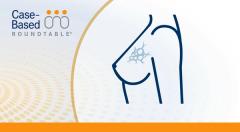
Sequencing and AEs Guide Next Steps for Dato-DXd in Breast Cancer
Virginia G. Kaklamani, MD, DSc, discusses datopotamab deruxtecan and other antibody-drug conjugates available for patients with unresectable or metastatic hormone receptor-positive, HER2-negative breast cancer.
Episodes in this series

Virginia G. Kaklamani, MD, DSc, professor of medicine in the Division of Hematology-Medical Oncology at The University of Texas Health Science Center San Antonio, discusses datopotamab deruxtecan (Dato-DXd; Datroway) and other antibody-drug conjugates (ADCs) available for patients with unresectable or metastatic hormone receptor-positive, HER2-negative breast cancer.
The integration of Dato-DXd into the treatment of metastatic breast cancer comes with uncertainties about the sequencing of ADCs and the comparison of real-world toxicities, according to Kalamani. Sacituzumab govitecan (Trodelvy) appears to have more severe cytopenias and diarrhea. However, Dato-DXd and trastuzumab deruxtecan (T-DXd; Enhertu) may have more instances of interstitial lung disease (ILD).
Additionally, concerning the overall survival (OS) outcomes of the phase 3 TROPION-Breast01 trial (NCT05104866), it is unclear whether the lack of OS difference with Dato-DXd vs chemotherapy is due to crossover or other efficacy issues. Kaklamani emphasize the need to decide the sequencing of ADCs and the choice of first treatment, considering the similar payloads of topoisomerase inhibitors and the subsequent treatment options after disease progression.
These issues are top of mind now that the
TRANSCRIPTION:
0:10 | I think that Dato-DXd will be incorporated into the standard-of-care treatment of patients with metastatic breast cancer. There are a few unanswered questions. First of all, how do we sequence these ADCs? Secondly, in the real world, how are the toxicities comparable between the 3 ADCs that we have? It seems that sacituzumab will have a lot more cytopenias, more diarrhea, [and] no stomatitis. Dato-DXd and T-DXd will have some incidence of ILD. Dato-DXd [has] very little [incidence of] cytopenias. I think, based on what we're seeing, it looks like Dato-DXd will be more favorable as far as AEs compared with the other 2 ADCs.
0:57 | The OS not being significant is something that we're going to need to wait on the data and to try to decide as a community whether the lack of OS is because of crossover or because of just other efficacy issues. So I think those are the 2 things that we're going to have to be thinking about when we treat these patients. All 3 ADCs use a similar payload of a topoisomerase 1 inhibitor, so it might be a little naive of us to think that if we sequence them, we're going to get good benefit from each one of them. It'll be pretty important to decide which one to give first and then how to move on to other treatments, including chemotherapy, after a patient has had progression of disease from that first ADC.














































